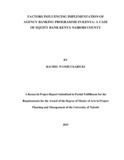| dc.description.abstract | The purpose of the study was to investigate factors influencing implementation of agency
banking programme in Kenya. Specifically the study sought to determine the extent to
which security concerns, availability of resources, infrastructural support and regulatory
framework influence implementation of agency banking programme in Kenya. The study
employed descriptive research design. The population of the study was 38 management
and operational staff in the Agency department in Equity bank Branches as well as 1037
Equity agents that were contracted by Equity bank within Nairobi County. All the 38
branches were considered for the study where one staff member participated in the study.
Stratified random sampling technique was used to select the sample size for Equity bank
agents who participated in the study whereby a 10% sample was taken; this gave a
sample size of 103 agent staff. The study collected primary data through use of both a
questionnaire and an interview guide. The questionnaire was filled by the Equity bank
agents while the interviews were conducted on the bank staff who included the
management and operational staff in the Agency departments. A pilot test was conducted
to prior to the actual data collection whereby the instruments were tested for reliability
and validity. Reliability test was carried out though Cronbach alpha test while validity of
the questionnaire was established by the research and supervisor reviewing the items. The
objectives of pre-testing was to allow for modification of various questions in order to
rephrase, clarify and or clear up any shortcomings in the questionnaires before
administering them to the actual respondents. During data collection, the study first
sought permission from the management of Equity bank to collect data from the bank
employees. An introductory letter for data collection was also obtained from University
and further appointments made with the respective respondents. The researcher used
trained research assistants for data collection process. The data was analyzed through
descriptive and inferential statistics. The descriptive statistics included frequency
distribution tables and measures of central tendency, measures of variability and
measures of relative frequencies among others. The inferential statistics entailed a
regression analysis. The analysis was aided by the SPSS software. The analyzed data was
presented in tables and charts. The study found out that security, availability of resources,
infrastructural support and regulatory framework affected implementation of agency
banking programme to a great extent. The study concludes that there is a positive and
significant relationship between implementation of agency banking and the factors:
availability of resources, infrastructural support and regulatory framework. The study
recommends that the bank should adopt a more improved risk based approach to the
supervision and regulation of agency banking. To ensure a successful implementation of
agency banking programme, there is need for improved support by all players, that is; the
CBK as the regulator, the banks and the licensing bodie | en_US |

